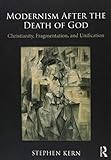Modernism after the death of God : Christianity, fragmentation, and unification / Stephen Kern.
Material type: TextPublication details: New York, NY ; Abingdon, Oxon : Routledge, an imprint of the Taylor & Francis Group, c2017.Description: x, 189 pages ; 26 cmISBN:
TextPublication details: New York, NY ; Abingdon, Oxon : Routledge, an imprint of the Taylor & Francis Group, c2017.Description: x, 189 pages ; 26 cmISBN: - 9781138094369
- 1138094366
- 9781138094031
- 113809403X
- 1800-1999
- Modernism (Literature)
- Christianity and literature -- Europe
- Sex (Psychology) in literature
- European literature -- 20th century -- History and criticism
- European literature -- 19th century -- History and criticism
- Christianity and literature
- European literature
- Modernism (Literature)
- Sex (Psychology) in literature
- Europe
- 809.9112 23
- PN56.M54 K467 2017
| Item type | Current library | Home library | Call number | Copy number | Status | Date due | Barcode | Item holds |
|---|---|---|---|---|---|---|---|---|
 Book
Book
|
Ayesha Abed Library General Stacks | Ayesha Abed Library General Stacks | 809.9112 KER (Browse shelf(Opens below)) | 1 | Available | 3010034454 |
Includes bibliographical references and index.
Introduction: from Christian unity to modernist unification -- Friedrich Nietzsche: greatness, meaning, and authenticity -- James Joyce: wholeness, harmony, and radiance -- Sigmund Freud: psychoanalysis and psychosynthesis -- D. H. Lawrence: spontaneous-creative fullness of being -- Andr�e Gide: wholly available to life and love -- Martin Heidegger: pursuing the question of being -- Virginia Woolf: creating shape out of chaos -- Conclusion: a modernist ideal type.
"Modernism After the Death of God: Christianity, Fragmentation, and Unification explores the writing and philosophies of some of the most popular modernist figures studied today. This ground-breaking work, is an interpretation of the life and work of Friedrich Nietzsche, James Joyce, Sigmund Freud, D. H. Lawrence, Andr�e Gide, Martin Heidegger and Virginia Woolf that shows how each related to and drifted from religion in large part because they believed that Christian sexual morality had damaged or threatened to damage their love life" --
ENH


There are no comments on this title.